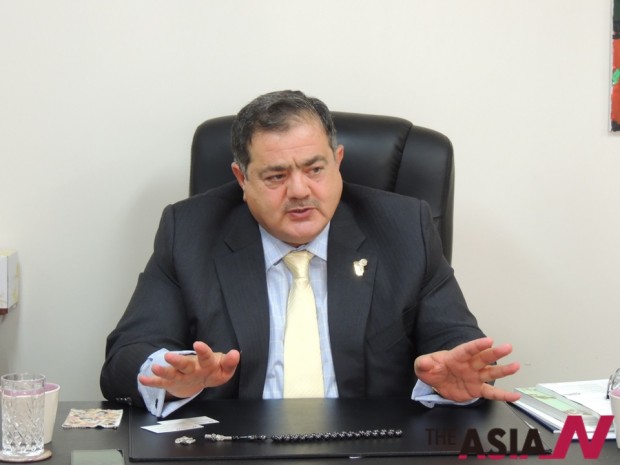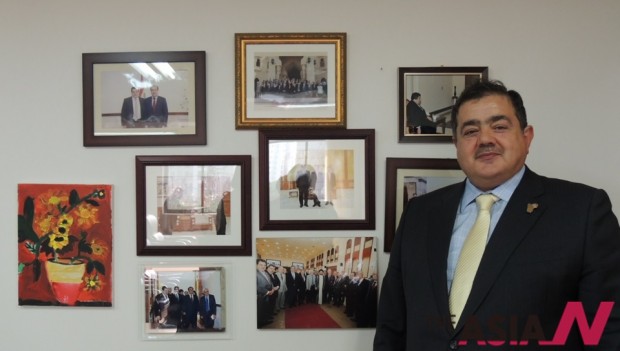“Today is the Day to Work in Iraq”
Interview with Iraqi Ambassador Khalil Al-Mosawi
The Iraqi envoy to Korea, Ambassador Khalil Ismail Abdul Sahib Al-Mosawi, in an interview with the Magazine N expresses his hopes to change the perceptions about Iraq, and how his oil and water-rich country is ripe for investments. “Iraq has been the cradle of civilization, culture, religion and history for thousands of years. The previous regime and terrorism disabled the country from being the great country that it is.” He says that Iraq is doing its best to be the country that it used to be before the regime of Saddam Hussein and this would entail the help of the international community as well. The ambassador ensures that “Iraq is ready for the world. We are doing our best as well to retrieve its confidence.”
In an interview last November 6, Iraq’s envoy to Korea tells how the repressive regime has destroyed the country that he used to know after coming back in 2003. Ambassador Al-Mosawi shares, “When I came to Iraq for the first time after 28 years, I didn’t recognize it at all. People were in a desperate situation to live. Survival went into family relationships; people sold everything that they could. Fathers and mothers sold their own children in the streets, knowing that their children could at least survive with someone else. That was the state of Iraq.”
He tells the Magazine N that it was his personal quest to help his embattled country and bring it from the rages of war and terrorism. He retells the story of Iraq through his eyes, explaining what the country was before and after the war, and what the country has done in moving forward.
Iraq Before and After the Regime
“In understanding Iraq, one needs to understand first what the country was before the former regime,” says Ambassador Al-Mosawi. “Wealth was in the excess of what Iraq needed in the 1950s,” says Iraq’s top diplomat to Korea. Citing the consumption and education levels of Iraqis at that time, he says that it can easily be compared with other European countries. He describes the bustling streets of Baghdad with the cosmopolitan middle class, full of energy and life, and how it has allowed for the peaceful co-existence of traditional tribes and other cultures that have flourished in the country for thousands of years. He points out that this rapid development of Iraq stems from the strong emphasis of the then Iraq government on education.
Iraq is part of what is known to be the Fertile Crescent, a region in the Middle East that is relatively moist and fertile, providing a good environment for vegetation, where Iraq is home to the Tigris and Euphrates Rivers. The area is often referred to as the Cradle of Civilization, as it was able to oversee huge development in human history including inventions such as writing and irrigation.
However, everything changed in 1968 when Saddam Hussein forcefully assumed control. “The regime was responsible for many wars. If you think about how the regime destroyed Iraq, in 1980, Iraq had in its foreign reserves about USD 38 billion for a population of 12 million. We had revenue from oil of about USD 26 billion. Saddam launched a war against Iran, which lasted about eight years. At the end of the war, looking at the figures again, from USD 38 billion we had in the reserves, now we owed the world USD 82 billion,” explains the ambassador, “However, while even it was already beyond its ability to build its infrastructure, Saddam diverted his attention from rebuilding Iraq to invading Kuwait, even though Kuwait stood with Iraq in its war with Iran, supporting it financially and opening its country to the Iraqi people.”
What destroyed Iraq, however, is what the ambassador referred to as the “hidden wars.” The first of these “hidden wars” was economic. “After the liberation of Kuwait, Iraq went under international sanctions. Those sanctions hurt the Iraqi people very badly, because it has reached to medicine and food, and it has dropped the levels of income and prosperity. People were in a desperate situation to live.” In addition, the ambassador explains that the focus on military spending of the repressive regime has blown up Iraq’s debt to the world up to USD 350 billion, not to mention the loss of world trust.
Second is the collapse of the institution of education. “From a highly educated nation, we have over 10,000 schools deteriorating, ready to fall down and collapse. 45 percent of the 32 million Iraqis are illiterate,” explains Al-Mosawi. This coincides with the lack of infrastructure in the country, which disables the provision of basic services for the people.
The third of the “hidden wars” that Ambassador Al-Mosawi describes still threatens the development of the country up to this very day. “Iraq has attracted terrorism from around the world. From Al Qaeda, these terrorists took up all issues to Iraq, which has breached our borders and has put our people in constant danger.” He explains that the cultural importance of Iraq, being the birthplace of several of the world’s religions, is being threatened because of terrorism.
Rebuilding a Nation
In the reconstruction of the country, Ambassador Al-Mosawi focuses on the role of democracy. “Today, in Iraq, I’m proud to say that we have conducted three national elections and we have proven to the world despite difficulties that we have changed a page and now we fight, but across the table in negotiations, and also we have a peaceful way of transforming power,” states Al-Mosawi.
He cites that over 25 percent of the parliament is women. Introspective of the current state of security in the country, the ambassador addresses it head-on. “While other people may say that we haven’t done anything in the past 10 years, I believe that we have been successful in slowly bringing the system back in place,” he says. He also explains that the role of Iraqis in reconstructing their country is very important. “If we look at the political parties, newspapers and television and radio, NGOs working in the society, cultural institutions opening up since 2003, you can tell that we have made significant changes in terms of expression, in terms of freedom of speech and gathering, and political party,” claims Al-Mosawi.
“Economically, we are still suffering. We still need to develop infrastructure, which has a long way to go, but I think that all will be done. I am very happy with our new government, the relationship between the three branches of government is healthy, they are cooperative, and they complete each other. That is what Iraq needs,” asserts the ambassador. He is glad to report that the Iraq now has been producing about 3.6 million barrels of crude oil per day, which the country aims to increase to 6 million barrels by 2017, only coming from 155 regions of the 530 regions with oil reserves. He says that just recently, Iraq has discovered gas, which may supply about 20 percent of the demand in Europe.
In diversifying the revenue base of the country, Iraq still has a long way. “About 97 percent of the revenue comes from crude oil; refinement is another issue of its own because of the lack of infrastructure,” says Al-Mosawi. He explains that the country is still looking for investors in this capital-intensive industry, in which the role of Korea has been robust and growing. He has reported that Iraq has just signed an agreement with Korea under a consortium with three Korean companies in the construction of a refinery in the Karbala region, which is tagged to possibly produce 140,000 barrels of oil per day to fetch a total amount of USD 6.04 billion in revenues.
As such, he believes that the role of foreign relations for the development of Iraq is important, particularly in regaining the trust of the international community. “We have been continuously working to boost investor confidence and push it towards sustainable growth. The biggest confidence in the country is that the Iraqi Central Bank has reserves of about USD 96 billion, a stark difference to the negative USD two billion that we had in 2003. This is one of the commitments of Iraq to build confidence, and ultimately, regain the trust of the international community,” he asserts. He admits to the Magazine N that in this light, the task of an ambassador is never-ending. “I have just recently stayed in Baghdad for 28 days for one reason alone: to tell the people here in Korea that the government I work with and my country is safe,” shares Al-Mosawi. “We want to create an environment for investors and show that there is money in Iraq… We will not stop, even if it entails that we need to work beyond what is needed. We want investors and the international community to realize our message that ‘Today is the day we work in Iraq’.”

























































